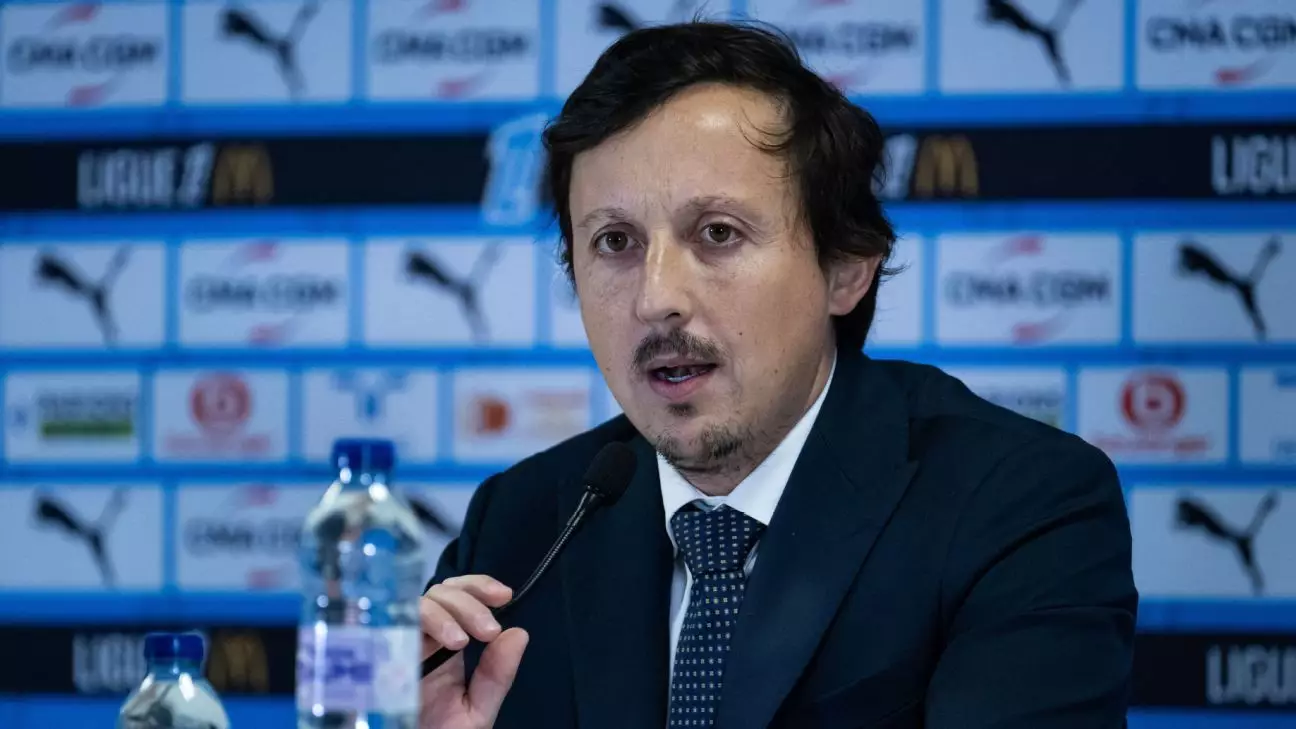In the world of sports, few things create as much tension as a controversial refereeing decision. Recently, the landscape of French football has been rocked by heated accusations from Olympique de Marseille’s president, Pablo Longoria, following his team’s disheartening 3-0 defeat to Auxerre. His comments have reignited an ongoing dialogue about the integrity of officiating in the Ligue 1, revealing deeper rifts in French football and prompting the French Football Federation (FFF) to take a stand in defense of its referees.
Longoria’s vehement statements regarding alleged corruption among referees were made in the aftermath of a match that left Marseille lagging significantly behind league leaders Paris Saint-Germain (PSG). In his frustration, he accused the officiating of being part of an organized conspiracy against his club, remarks that could easily be seen as a desperate attempt to explain away another disappointing performance. This accusation, one of the most serious yet, marks a significant escalation in Marseille’s ongoing complaints about officiating this season.
Marseille’s struggles have been evident; with a five-match losing streak pushing them down the rankings, Longoria’s emotional outburst could alternatively be interpreted as an acceptance of their team’s poor performance during the season rather than the fault of refereeing. The mounting pressure of underperformance has seemingly led to a blame game within the club, ultimately framing the narrative in a way that shifts responsibility away from the players and coaching staff.
In an immediate response, Philippe Diallo, president of the FFF, condemned Longoria’s comments vehemently, describing them as both defamatory and unacceptable. Diallo’s solidarity with referee Jérémy Stinat demonstrated the federation’s commitment to maintaining the integrity of officiating in French football. His statement hinted at a growing concern that public accusations of corruption could undermine the credibility of the entire league. Such comments, Diallo warned, threaten not just individual referees but the image of Ligue 1 as a whole.
The drama took an additional turn as the referees’ union, known as SAFE, expressed outrage over Longoria’s statements. This reaction highlights an unfortunate trend where accusations of poor officiating lead to legal threats and the potential for defamation lawsuits. In a sport that prides itself on fair play, the emotional toll of such public disputes undoubtedly casts a shadow over the game’s integrity.
The specific incident that fueled Longoria’s outburst was the dismissal of Marseille’s Derek Cornelius, which he and coach Roberto De Zerbi branded as “scandalous.” De Zerbi’s admission that the team did not perform well was overshadowed by his criticisms of referee decisions. His statement that none of the referees were up to standard calls into question the competency of officiating in Ligue 1, which could further deepen the already palpable mistrust between clubs and match officials.
Adding to the discontent, former Marseille player Fabrizio Ravanelli echoed this sentiment, suggesting that the referee “did not know what he was doing,” which highlights an aspect of sports culture where opinions from former athletes can influence public perception on officiating quality. This criticism, combined with prior controversies involving Marseille’s director of football and the club’s captain’s suspensions, creates an ongoing narrative that could impact the future dynamics of referee-club relationships in French football.
As Longoria and Marseille grapple with their position in Ligue 1, the implications of this debate stretch beyond a single match or season. The atmosphere of distrust towards referees can lead to a breakdown in the spirit of the game, where players self-censor in the face of potential retribution from both officials and the federation. This growing divide also threatens the overall quality of competition in Ligue 1 as teams may feel derailed by external factors beyond their control.
The ongoing saga between Marseille and the referees exemplifies how easily sporting rivalries can morph into bitter clashes off the field. As the FFF stands firm in defense of its officials and the referees’ union prepares to pursue legal action, it becomes evident that a reckoning is needed. Dialogue and reform centered on respecting referees and addressing legitimate grievances constructively may be vital to restoring harmony in French football as the season progresses. With the stakes so high, the outcome of such controversies will determine not only Marseille’s fortunes but the overall health of the sport in France.
